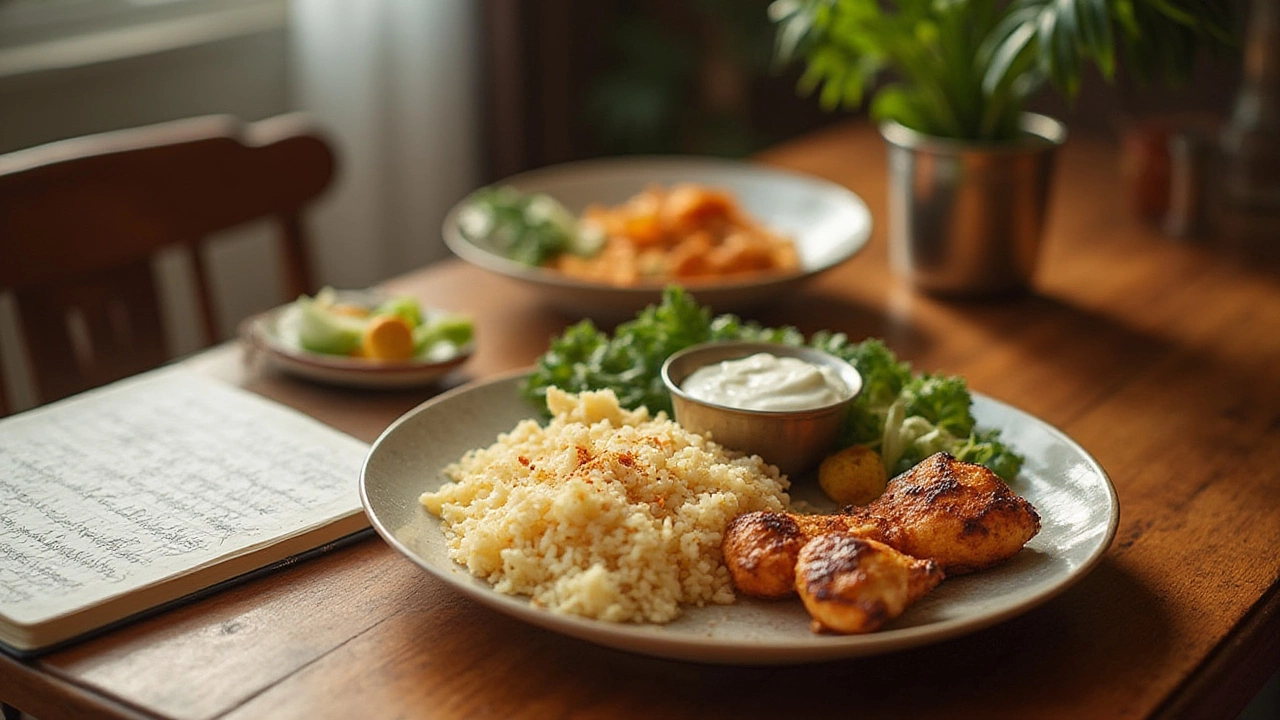
- Jul, 29 2025
- 0
When it comes to public weight loss journeys, hardly anyone is as open and real as Al Roker. For years, viewers watched him banter on NBC’s "Today," but behind that iconic smile there was a personal struggle with weight. Al’s transformation didn’t happen because of some secret celebrity cleanse — it started with everyday frustration and a doctor’s reality check. The guy’s journey is packed with honest setbacks, old-school hustle, and a diet that almost feels like rebellion in a carb-obsessed world. So, what diet is Al Roker on these days, and how did he manage to shed so many pounds and keep them off?
The Story Behind Al Roker’s Diet Shift
Al Roker isn’t shy about discussing his health. For years, his weight was in the headlines just as much as his daily weather forecasts. He tipped the scales at over 340 pounds at his heaviest—a number that alarmed him as a husband, father, and someone whose bloodwork was trending dangerously. Al was even told by a doctor, point-blank, that he wouldn’t live to see his daughter graduate unless something drastic changed.
He tried the trends: low-calorie, vegetarian, meal delivery kits—you name it, he probably tested it. But nothing seemed to stick. Then, in 2002, he decided to get gastric bypass surgery, a major move and not a magic cure. He dropped over 100 pounds, but keeping it off was the real challenge. Life, stress, and old habits crept back in. Sound familiar? Al’s honesty about weight gain after surgery is something a lot of people relate to but rarely hear about: surgery helps, but it’s not the end of the story.
His wake-up call came with another health scare years later in 2020—prostate cancer. It forced him to rethink his routines from the ground up, focusing even more on his diet, mental health, sleep, and fitness. Al became a champion for taking small, practical steps, admitting when he slipped, and testing new approaches that weren’t always mainstream.
Understanding Al Roker’s Current Diet: The Power of Keto
If you want the inside scoop, Al Roker attributes his latest health success to the ketogenic diet, or “keto” for short. Keto isn’t just another quick fix or juice cleanse. It flips the script on what many Americans know about eating: instead of bread, pasta, and sugary snacks, keto puts fats front and center, keeps protein steady, and almost banishes carbs completely.
His version isn't extreme. Al swaps out white rice for cauliflower rice, enjoys cheese, eggs, avocados, olive oil, and lots of leafy greens. Breakfast? Maybe an omelet with spinach and mushrooms. Lunch? Grilled salmon with asparagus. Snacks? Almonds, not chips.
He’s talked about it on his social media and even duked it out on air with fellow host Jillian Michaels who’s keto-skeptical. Al’s take is blunt: it works for him, and his biomarkers—like blood sugar and cholesterol—have improved since he started. He tests his ketone levels regularly to make sure he’s in the right metabolic zone. But here’s what stands out: Al isn’t dogmatic. He’ll enjoy a slice of pizza for his birthday, but he gets back on track the next day. For him, it’s about consistency more than perfection.
If you’re curious about numbers, here’s a peek at what keto typically means:
| Nutrient | Standard Keto Diet (% daily calories) |
|---|---|
| Carbohydrates | 5–10% |
| Proteins | 20–25% |
| Fats | 70–75% |
Even with all the fat, his bloodwork’s improved. One study in 2019 published by the American Journal of Clinical Nutrition backed up his claims, showing improved cholesterol and weight loss in patients on a well-formulated ketogenic diet.

What a Day of Eating Looks Like for Al Roker
Let’s talk specifics. People always want to know: what’s on a guy like Al’s menu? He keeps it pretty simple and repeatable—something anyone can try adjusting for their own needs.
- Breakfast: Omelet made with whole eggs, mushrooms, spinach, and cheddar cheese. Coffee (usually black, sometimes with a splash of heavy cream).
- Lunch: Grilled chicken breast or salmon, big serving of leafy greens (kale, arugula, romaine). Olive oil and lemon juice as dressing. Sometimes a bit of feta.
- Snack: A handful of almonds or walnuts. Sometimes sliced cucumbers dipped in guacamole.
- Dinner: Bunless burger (often turkey or beef) with sautéed vegetables. Maybe roasted cauliflower or broccoli on the side.
- Dessert: Sometimes sugar-free chocolate or a homemade chia pudding with unsweetened almond milk. But often, dessert just isn’t there—it’s a habit he’s replaced with herbal tea.
He drinks lots of water and tracks his food using an app to keep his carbs in check. The biggest shift? Not depriving himself until he breaks, but building in foods he enjoys. His wife, Deborah Roberts, helps keep him honest in the kitchen. They often cook together, focus on seasonal ingredients, and lean into the flavors—herbs and spices make all the difference for them.
It’s worth mentioning here that Al doesn’t shy away from flavor. Low-carb eating gets boring fast if you eat bland food. He uses garlic, onion, cumin, even chili flakes liberally. If you’re struggling with bland diets, this tip’s gold.
The Impact of Exercise and Lifestyle Choices
You can’t talk about Al Roker’s diet without mentioning his workouts. While diet gets a lot of attention, he points out that movement is crucial, especially as you age. He walks—sometimes more than 10,000 steps a day. He also does resistance bands and light weights. Nothing crazy, but it’s the consistency that matters.
Al’s approach is very practical: make exercise something you can do every single day, not just on a resolution. He often wakes up before dawn for work, so morning is key. Even on the road, he does quick hotel room routines. He says music is his hack—a killer playlist makes him stick with it.
Another tool in Al’s kit is sleep. After his cancer diagnosis, he took sleep more seriously. Studies show lack of sleep wrecks your hunger hormones, making you crave junk food. His tip? Set an alarm for bed, not just for waking up. He cuts off screens an hour before bedtime and reads something relaxing.
Stress management matters too. Meditation is now a habit. He uses guided apps and takes a few deep breaths when the day gets wild. Keeps mood swings (and snack attacks) in line. Fans may not realize that TV personalities deal with constant pressure, and Al’s approach to handling public life while keeping his diet on track offers hope to regular folks facing chaotic schedules.

Real Tips from Al Roker’s Experience: What Works for Him
Al Roker’s not about miracle fixes, and his advice reflects that honesty. If you want to try a keto diet or something similar, start slow. He always says to consult your doctor, especially if you have health conditions. Track your food for a few days before cutting anything out—you’d be shocked by where hidden carbs sneak in.
Don’t demonize fat. Healthy fat—avocado, olive oil, nuts—actually keeps you full longer. Al’s favorite move? Prepping meals on Sunday so the fridge is stocked for the crazy morning rush.
Here are a few more tips from Al’s playbook:
- Find a partner: Family support is huge. Doing it together makes temptation less tempting.
- Ignore the haters: Everybody online has an opinion. Listen to your body and your healthcare team, not anonymous commenters.
- Be real about slips: Ate the cake? Don’t spiral. Eat right at the next meal. One meal at a time is how habits stick.
- Spice it up: Use bold flavors. Boring food kills diets fast.
- Set realistic goals: He measures progress by energy, mood, and blood markers—not just the scale. Find a metric that motivates you.
And here’s a stat that backs this up: A 2023 Yale study found people are more likely to stick with a diet if they track non-scale victories like improved mood, energy, or better sleep.
Weight loss is personal—no two people’s bodies react the same. Al Roker’s story proves it’s not about chasing quick fixes but building routines that feel doable. Eating more healthy fat, skipping heavy carbs, moving daily, and asking for support isn’t fancy advice. But for him, it worked. Listening to your own body and making changes that last—maybe start there.
Nikhil Verma
I'm a dedicated physician with a passion for exploring the intricacies of medicine, focusing on the unique healthcare challenges in India. I spend much of my spare time writing articles aimed at improving public understanding of health issues. Balancing my clinical practice and writing allows me to reach a wider audience, sharing insights and fostering a deeper appreciation for medical advancements. I derive immense satisfaction from both treating patients and engaging with readers through my writing.